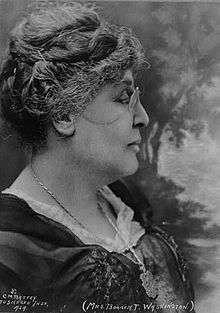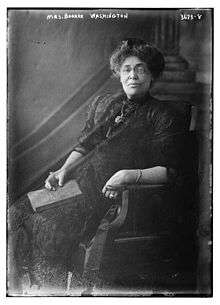Margaret Murray Washington
| Margaret Murray Washington | |
|---|---|
 Washington in 1915 | |
| Born |
Margaret Murray March 9, 1865 |
| Died | June 4, 1925 (aged 60) |
| Known for | anti lynching activism |
| Spouse(s) | Booker T. Washington |

Margaret Murray Washington (March 9, 1865 - June 4, 1925) was the principal of Tuskegee Normal and Industrial Institute, which later became Tuskegee University. She was the third wife of Booker T. Washington She was inducted into the Alabama Women's Hall of Fame in 1972.[1]
Biography
Margaret Murray was born on March 9 in Macon, MS in the early 1860's. Her birth year is unknown as her tombstone says she was born in 1865, but the 1870 census lists her birth year as 1861. She was one of ten children born to sharecroppers. Her father was of an Irish immigrant. Her mother was an African American washerwoman and possibly a former slave. Her father died when she was seven, and the next day she moved a Quaker couple by the name of Sanders. They encouraged her to become a teacher, one of the few occupations available to women at the time.
As a child Murray spent much of her time reading and quickly excelled in school. By the age of fourteen, she was so advanced in her studies that the school offered her a teaching position. Determined to further her teaching career, at the age of nineteen, Murray enrolled in Fisk University, where she completed the college preparatory course in five years and college in four.
Marriage
It was at Fisk that Murray first met Booker T. Washington. Regarding her as a model student, Washington asked her to take over the position of Lady Principal, formerly held by his deceased second wife. By 1890, Murray was writing to Washington to express her deep feelings for him. He proposed the following year and, after some hesitation, Murray accepted Washington's proposal and they were married in 1893. Murray and Washington shared a home with Washington's relatives and his children from his previous marriage until "The Oaks", the homestead which was built for their family was constructed in 1901. Washington was reluctant to share his feelings with Murray, and often left her to tend his children while he was away on business. Though Washington never got over the loss of his first two wives, he believed that Margaret provided a well-ordered household, and the two were generally happy with their marriage. Margaret wrote Washington's speeches and she helped her husband in expanding the school and traveled with him on his tours and speaking engagements.[2]
Career
During her tenure as Lady Principal of Tuskegee, she also created the Tuskegee Woman's Club and merged local organizations with women clubs to help improve the values and liberation of womanhood in African American women of the Jim Crow south. In 1895 she gave an influential speech titled "Individual Work for Moral Elevation" at the First National Conference of the Colored Women of America.[3] She is credited with co-founding the National Association of Colored Women in 1896 [4] She founded country schools, taught women how to live and attend to their homes, worked for the improvement of prisons, started the Mt. Meigs school for boys and an industrial school for girls at Tuskegee, and constantly worked for the betterment of the poor and neglected. In 1912, she became the fifth president for the National Association of Colored Women.
After the death of her husband in 1915, Washington remained a powerful source in the women's liberation movement and in improving the educational system for African Americans. She became deeply involved in domestic education for mothers in Tuskegee and in supporting schools for children at surrounding plantations.
Like the programs advocated by her husband, Margaret Murray Washington focused on domestic and vocational education. She became involved in interracial cooperation and participated in the path breaking Memphis Women's Inter-Racial Conference in 1278.
Death
Margaret Murray Washington remained at the "The Oaks" until her death in 1925. She is buried at the university cemetery, adjacent to her husband's burial site.
Legacy
In 1972, Washington was inducted into Alabama's Women Hall of Fame for her compassion, intelligence and independence of judgement which led her to be among the greatest women and African American leaders of her century.
M.M. Washington Career High School in Washington, DC was named in her honor. The school closed in 2008.
Activist for Anti-Lynching
Around the 1890s early 1900's many black people of the south were being targeted as victims of lynching. With the increasing numbers of lynching going on with blacks many organizations started to form during this period. In 1895 a huge group of black women formed the National Federation of Afro-American Women and Margaret Murray was voted the president.
This organization did an array of jobs from helping women in the south that were trying to buy a house to opening day care giving women an opportunity to go to work. By putting together the NFAA and the Washington Colored League formed the NFAAW. Margaret was a firm believer that many of the racial issues could be fixed through interracial cooperation. She believed that not everyone was out to harm people of color.
In 1920 a NACW Conference was held in Tuskegee, Alabama. The main topic on the agenda was lynching. Many of the recently founded anti lynching organizations in attendance expressed their support in a bill that defines lynching as an act or "murder" if the act is performed the killer will have to suffer repercussions for their actions. Two white important women were in attendance Carrie Parks Johnson and Sara Estelle Haskins from the Southern Methodist Women's Committee were invited to Margaret's home. Both women were shocked at the huge amount of highly educated black middle class women there actually were.[5]
Black Women Rising to Power Supporter
She delivers a speech in 1898 called "“We Must Have a Cleaner Social Morality,”[6] in this speech she is giving advice to black women specially
- criticism it not always negative it helps black women evolve
- She states our race needs to be strong
- stop taking yourself out of the group look at the black race as a whole a family
- start building each other up no more tearing each other down
- She criticizes motherhood that black women must do a better job of parenting
- As a black race we must be morally dignified in our actions
- Do not judge every white person as being racist not all are
- get educated
- The alarming rate of increased death rate and the rising number os illegitimate births
- gives statistics on how most southern cities populations of blacks is normally higher than the populations of whites
- be aware of your health are family histories with diseases
- being educated on what racial notations to look for in certain situations
Quotes
"If we wish to help each other let us not only praise ourselves, but also criticize. Plain talk will not hurt us."
"Praise a child always and he will soon get the point to where he thinks it is impossible for him to make mistakes."
"We cannot separate ourselves from our people, no matter how much we try; for one, I have no desire to do so."
" The condition of our race, brought about by slavery, the ignorance, poverty, intemperance, ought to make use women know that in half a century we cannot afford to lose sight of the large majority of the race who have not ,as yet, thrown off the badge of the evils with which I mentioned."[7]
Notes
- ↑ "Inductees". Alabama Women's Hall of Fame. State of Alabama. Retrieved February 20, 2012.
- ↑ "Washington, Margaret Murray (1865-1925) | The Black Past: Remembered and Reclaimed". www.blackpast.org. Retrieved 2016-12-07.
- ↑ Neal, Anthony W. (February 18, 2016). "Josephine St. Pierre Ruffin: A pioneer in the black women’s club movement Part 2". The Bay State Banner.
- ↑ http://english.illinoisstate.edu/kalmbach/351/hypertext98/hankins/african/Washington.html
- ↑ Anne Rouse, Jacqueline (1966). Out of the Shadow of Tuskegee: Margaret Murray Washington, Social Activism, and Race Vindication. Association for the Study of African American Life and History.
- ↑ ""We Must Have a Cleaner Social Morality,"".
- ↑ "(1898) Margaret Murray Washington," We Must Have a Cleaner Social Morality"". http://www.blackpast.org/1898-margaret-murray-washington-we-must-have-cleaner-social-morality. Charleston News and Courier. External link in
|website=(help)
External links
- M. M. Washington Career High School Website at www.k12.dc.us
References
- Washington, Margaret Murray (1865-1925) | The Black Past: Remembered and Reclaimed at www.blackpast.org
- (1898) Margaret Murray Washington, –We Must Have a Cleaner Social Morality,– | The Black Past: Remembered and Reclaimed at www.blackpast.org